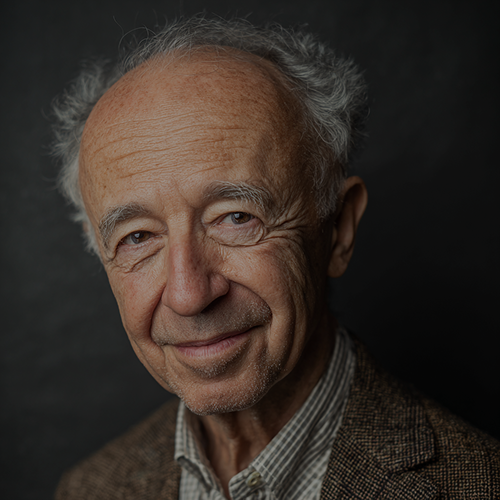Ann Le Cam: My career sounds sometimes a little unconventional because I changed different functional areas. But I think there was one big true line, which was people. At the time of the transition into production, the role had become available because the previous leader was leaving.
And I had built a strong relationship with that previous leader, because we were driving change. And when change and transformation comes, it's more of a horizontal exercise where you need your fellow leaders aligned with the purpose of where you're going. And you constantly need to align people, process, and tools.
And so, I felt that in my HR role, in my talent role, I could only go so far. And then there was, of course, production and the making of these movies. And it was difficult to influence that area without being in charge of it.
And so when the opportunity arose, and my leaders asked me whether I might be interested, I had been close enough to it to understand enough - I wasn't an expert. Between those two, I knew enough to actually lead the group and try to continue the transformation without having another partner to bring along for the ride.
I assume those leaders had to have great trust in you in order to offer you that position?
Ann Le Cam (4:19): Yeah, for sure. I think that at the time, I had already done a part of the transformation in my role in HR. And I think we were fundamentally aligned on purpose and values, and where we actually wanted to go, and that they could see that with the work that I had done so far, I had made strides already, and could just be exponentially more impactful if my purview was larger.
How are you able to build trust after being placed in a role like the Head of Production when you had never produced a film before?
Ann Le Cam: First of all, I started by listening and being really curious because I had a lot to learn and so I went around and asked people what they were doing, why they were doing it the way they were doing it, what was difficult about it, how it could be improved. So I listened a lot. And I think that gave people pride of explaining to me what they were doing. Because if I asked questions, I asked questions without judgment. If I would ask, why are you doing it that way?
It was an honest question, because I didn't know, not because I was questioning why they were doing it that way - it was not a loaded question.
And so, I think that openness really allowed people to kind of build trust. And because I was in a role where I wasn't the expert, I had to trust people around me, I had no other choice. And I think that trust pays back in return. When you do that people know that you have their back if something goes wrong, or when they speak up and say something that might be uncomfortable, if you as a leader are there to help them through those moments, they will trust you in return for what you have given to them.
I think that was the start of the journey of just building those relationships, listening to what people have to say, really staying with the problem, and trying to make the environment better for them. And then when people started seeing improvements, it gained more and more trust that we were on the right path, we were going in the right direction and that gave some momentum to the exercise.
Felicia Shakiba: And change often comes with those who might be challenging the things that you're working on.
How did you meet people who were less adaptive to the change or improvements you were looking forward to?
Ann Le Cam (6:36): Yeah, I think in every change effort, there are people that are interested in following something new and different, and there are people that are loud, and they don't like it - most of the time that comes from insecurity. And then there are the people in the middle that are looking over the fence thinking it might be interesting, but definitely not taking a position yet until they see some momentum in the journey.
Initially, on my transformational journey, I paid a lot of attention to the people that were very negative because they were loud, and perhaps probably a little too much. I think it's really important to have conversations and try to understand what it is that is standing in their way. What are the competing commitments that make them so resistant to this change? What's the problem that is standing in the middle of the change?
And then - and why can't they come on board with the journey? I think that by listening and not listening just to what they say that they don't like, but listening deeper to what actually the problem is that is standing there, and then finding solutions for them, they can come along for the journey.
And so, I had to continue creating processes and make sure that I kept everybody in the boat and that everybody was aligned. But, for the people that were allowed and resistant. Ultimately, when the movement was taking roots, and it was going in a good direction, some would change their mind and come on the journey. Others were still too resistant and probably couldn't get on board with the journey and they might have had to leave.
Those voices are fairly loud. Is it fair to say that you needed support from your manager or other leaders to help you move in a specific direction, even when those voices may cause friction?
Ann Le Cam (8:20): For sure, there are a lot of people to bring along for the journey. A lot of stakeholders you need to pay attention to, of course, your bosses and the people that are leading you, your peers and the people that stand next to you, and the people that report to you and the people you're leading. So there are a lot of people you constantly need to stay aligned with in order to make progress.
Despite the resistance. Despite the obstacles, despite the fact that sometimes doesn't go quite the way you would have hoped it would go.
So, being very clear on your purpose and your values and staying grounded in those and being able to communicate them over and over and over again, people understand that it won't always be a perfect journey, because you have to take risks. And that sometimes comes with a little bit of failure. But even in those moments being very clear as to why you took those risks and what the result was and staying very calm and grounded in your ideas and principles, I think helps a lot.
For the leaders. It was about communicating where I was going, where I was hoping to go, and where some of the resistance might come from, if I was anticipating it, I would bring them along for the journey there to say this probably not going to go well. This is what the noise is, and this is how I want to respond to that. But being as proactive as possible to make sure everybody was staying together.
What were some of the other challenges you faced early on in your cultural change initiative, and how did you overcome them?
Ann Le Cam (9:52): My biggest challenge was probably that I was extremely impatient because I wanted to go faster than what the pace of the transformation actually allowed for. And, I had to learn how to slow myself down. And make sure that I always connected with the people that were going through their transformation, and make sure that I was not too far ahead of them, but that I could listen to their concerns and bring them along on the journey.
So, it required me to learn how to listen differently, and to really connect with where the people were in order to bring them somewhere else because you can't change what you don't understand. And so, I had to understand where people actually were on their cultural transformation, and what they were feeling what they were perceiving what they were concerned about what kept them up at night.
And if I really had a deep understanding of that, I could talk to those issues and bring them along for the journey.
In the beginning, I think I was too fast, and I just wanted to move forward because I felt a sense of urgency. But that isn't always how change happened. Change takes time, and you need to allow for that time to happen.
One thing that was interesting, was when I worked for Weta in New Zealand, a lot of my work was done remotely. And it was also about cultural change. But it was difficult in a remote environment, to feel the pace of the organization. So I never knew whether I was going too fast, or whether I was going too slow, because I wasn't physically there with them. It was all virtual, it was all remote.
And I think feeling the organization and knowing where you are. So you can take your next step is really important. And I had to learn how to do that virtually.
Could you describe what the action items were that you took to listen more - is that in the form of one on ones are they focus groups…?
Ann Le Cam (11:46): We did a lot of different things, you know, I think finding a way for people to speak honestly, and to make it okay for them to share what they really think is not an easy task. And for different people, it takes on different forms. So we had a program called Spark, which was a program where people could volunteer ideas, and then present them and then create a prototype for them, which was one way for us to gather new ideas and innovative thinking.
Another way that I personally handled that was by meeting three people a week that I didn't know in the organization. I would send them a note saying I would love to meet with you. But I would sit down as a part of my agenda to meet those people and just talk and ask why they were there, what they liked about it, and what they didn't like about it, to have an honest conversation.
Ultimately, that created a movement in the organization where more and more people wanted to be on that list of people that could come and talk to me.
But it was more than just saying my door is open, it was really going to look for people so they would talk to us. And we did all kinds of initiatives, we did executive talks, tee times, where people could all come together and just talk to leadership. That became habit in the organization. And as a result, I think more and more people felt free to speak up.
I'm curious to know how you collaborated with other leaders, potentially even those above you to implement the production change.
Ann Le Cam (13:17):
I think, originally, it was all about building a relationship of trust.
Spending one-on-one time with every single one of those leaders, understanding what their business was about - that is where I think HR was in such a fantastic position, because we know a lot about the business already by just being in the role. It's a role that is trans-functional. And so you can wander a little bit in other people's areas and learn. Strengthening those relationships was key. For me, it was very important at one point in my career to understand that as a leader, I needed to change my focus.
I thought my team-A were the people that were reporting into me, but as we were going through the transformation, I realized that my team-A was my peers, the people that were sitting next to me at the leadership table, and my team-B were the people that were working for me, who I equally needed to spend time and focus on them, but I trusted them.
Felicia Shakiba: What came out of those conversations?
Ann Le Cam: The purpose of those conversations was fundamentally to understand what they were worried about, what problems they were trying to solve and what their priorities were. So that I then could figure out how the transformative effort actually served them better.
When you're going through change, the ultimate question people ask is what's in it for me? If I could figure out where they were and what they were trying to solve for the organization and align it with where we were actually going, we could do this together.
That was fundamentally the first attempt in that effort. We then indeed aligned I think, very, very deeply on values and purpose and direction. And so, that accelerated in the organization because everything started singing together,
Is it fair to say that the loud voices of the change resistors would surface to your manager, essentially the CEO? And would that mean that the trust between you and your manager is critical to your success?
Ann Le Cam (15:17):
That's absolutely a true statement. There's always a danger that these voices will be heard by leaders.
I was hoping throughout the whole journey, I knew that I had the trust of my leaders, and they knew that we were going through a transformation. I stayed always very calm. And I always communicated where we were going, what the values were, what the direction was. Maintaining that trust is key, because there will be moments where the loud voices will be trying to get attention from somebody higher up to stop the movement.
In efforts to drive the transformative effort, I would always try to be one step ahead and have those conversations with them directly, so they didn't feel the need to go to my leaders.
Felicia Shakiba: Let's talk about psychological safety for a moment. For those leaders who haven't gone through a transformation, the movement sometimes requires us to start at the top.
The first thing I might ask is, do we have psychological safety among the executive team for transformation to even begin? How do you approach that scenario?
Ann Le Cam: Ha, ha. That's a big, big question. Well, I do think that it's the job of the leader to create an environment. When that environment sends signals about care and trust, people will start feeling that somebody else cares for you, they really deeply care for you, and about why you're there and about what you bring to the organization. That takes time to send that kind of message. But, it's also it's every single decision needs to send that message of care when that happens.
When people understand that they can trust you because you trust them. It's always a two-way street. When you start caring for people, they start caring for you.
When they care enough, they will talk the effort of speaking up in order to make something better is worth taking.
What guidance would you offer to an HR or functional leader who is required to collaborate with a CEO that has yet to grasp the principles of fostering psychological safety within their company?
Ann Le Cam: Ha. ha. Well, it's difficult to find your space in that environment. But what I would say is that it is important that we speak truth to power. I think that's part of our roles, and especially in HR, I think we have a responsibility. And one thing that I refer to very often is the shadow of a leader, I will ask my leaders questions about whether they're aware of the shadows that they cast in the organization when they're not in the room, what do people actually say?
How do they feel about them, and have them think about that most of the time, that is a very informative journey, where they themselves come to a certain realization that perhaps what they're projecting into the organization is not necessarily how they want the organization to behave.
But very often, an organization takes on the personality of its leader. So, it's very impactful for him or her to act or behave in a certain way.
I always start with self-reflection from the leader, when I find the right opportunity in order to start that process, because I think, by them, then seeing and getting that feedback, you can get into a trusting relationship partnership where you can together coach and help and point out the false notes in some of their behavior that might send the wrong signals into the organization and find that level of trust, even at that level.
Is there anything in particular that you teach at Harvard, that would be valuable to what we're learning about today?
Ann Le Cam (18:56):
"It was interesting that the people part and the ones that focused on cultural transformation and the employee experience were more successful than the ones that didn't. That's so difficult because a lot of people invest in technology, tools, and the infrastructure, but those things don't make a difference in the digital transformation process. "
Through my work with Harvard, we have done a lot of research on digital transformation in particular, so the impact and the influence of technology and how it influences how businesses operate. In the last couple of years, we've done surveys with executives around the world, as well as a written survey that was answered by more than 4,000 executives, so we have a lot of information.
What we particularly were looking for in our second edition was the companies that successfully do digital transformation - what did they do differently? What is different in their effort that makes them stand out? - because many of these efforts don't succeed. It was interesting that the people part and the ones that focused on cultural transformation and the employee experience were more successful than the ones that didn't.
That's so difficult because a lot of people invest in technology, tools, and the infrastructure, but those things don't make a difference in the digital transformation process.
When I was younger in my career, I remembered having a mentor, and at one point I said to demand that I think I'm spending too much time on the people. His response was, “Well Ann, you can never spend enough time on the people.” And so, the work that I’m doing right now at Harvard is a confirmation of that. It's really important to spend the time to bring people along, to train them, to up-skill them if needed, but to communicate with them and make sure that we're empathetic enough to understand what their concerns are so they can follow us on a journey.
What advice would you give to leaders who are currently working through a cultural transformation?
Ann Le Cam: It's not an easy journey, you have to be very resistant, and you have to allow time for change to happen. My words of advice would be to be competent and confident and consistent. Cultural change happens when everything starts coming together in a logical way. That could be the work you're doing, the processes you're having, but also the policies you have as an organization, how your building is laid out what your habits are, as you come together.
When that consistently starts sending signals, that change is going in the right direction, and that people can speak freely and shouldn't be worried about psychological safety. I think that's where change happens.
Felicia Shakiba: Is there anything that you want to talk about we haven't touched on yet?
Ann Le Cam (21:24): Yeah, I wanted to talk a little bit about the importance of understanding the problem. Staying with the problem long enough, before starting to go to solutions, especially in cultural change, people will start throwing out ideas and start doing things. But, sometimes without having spent sufficient time analyzing the problem, what's at the core of this?
It's a little bit like peeling an onion, where you see certain behaviors, and you're wondering why they are behaving that way, but it's actually something deeper underneath, and we start fixing the symptoms rather than really understanding the problem.
As a leader in an organization, I always keep saying to my teams to fall in love with the problem, don't go to the solution to quickly stay there, and make sure you have the right problem. Because if you fix that one, things will unfold a little bit like a flower. But if you're fixing the wrong one, it will just be a leaf and it fall off.
I think that's really important as we listen, to not listen necessarily to the ideas that people are suggesting to us, because then you will sit with 100 ideas, and you can't implement all of them. But really look at all these ideas and see what they have in common. What problem are they trying to solve? And when you can find that I think you can find richer solutions and more impactful movements in your cultural transformation process.
Felicia Shakiba: Ann, this has been wonderful. Thank you so much.
Ann Le Cam: Thank you so much, Felicia, thank you for the invitation. It's a pleasure to be here.
Felicia Shakiba: That's Ann Le Cam, executive fellow at Harvard Business School and former 30-year veteran of Walt Disney Animation Studios.
















